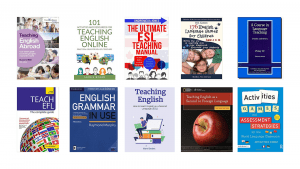How To Find a Job Teaching English
I work as an ELT teacher trainer and consultant now, but in the past I worked for several years as a teacher recruiter in both the ELT and international school sectors. In this article I want to share some of my ideas about how to approach a job interview for a teaching position, and how to find a job teaching English. Recruitment is a strange business and I see it very much as an art and not a science. It’s all about people, so you would need to personalise these ideas to be comfortable with them.
If this seems a little like a checklist, that’s because it is a checklist. I have seen far too many teachers over the years throw away the chance of a job offer through lack of pre-interview planning.
The CV
Take a long hard look at your CV and consider the questions it may create and try to plan the best answers. The issues that concern interviewers are unexplained gaps (it’s ok to be unemployed or work in a bar for a while), unclear qualifications (it’s either a CELTA or it isn’t!), broken contracts (you need to be able to explain why that happened) and lack of detail about the ages/levels/exams that you have worked with. After all, the interviewer needs to see if you are the right ‘match’. Most people working in ELT know that the story on teachers’ CVs can seem gypsy-like due to fixed term contracts.
On the subject of ‘matches’ I think it’s really useful to look at your CV before you apply for a post and have a hard think if it’s the right job for you. Blanket job applications are easy to spot and in my view waste time for everyone.
The Information
Get whatever you can. The institution’s website is a good starting point but in advance of the interview you should have access to the job description, person specification, summary of terms and conditions and, ideally, a sample contract. If these are not provided before the interview, then ask for them. I think an employer that does not provide this level of information may well skimp in other key areas of the teacher-employer relationship. I am, however, skeptical about most of the job forums and Trip Advisor-style employer review sites. They are far from rigorous and often full of fake postings.
Only by having access to this level of information can you get a real sense of the institution and the post, and thus make sensible decisions. And ask sensible questions of course. Never feel shy about asking for clarifications or about anything that concerns you. I worry a lot about teachers who have no questions in the interview, a new job choice is after all a potentially life-changing moment. That said, I also worry about questions that have already been answered in the documents I mention above!
The People
If the person interviewing you would become your line manager, as the interview progresses ask yourself “how would I feel about working with this person?”. This matters a lot – personality clash issues are one of the biggest causes of job failures.
Try to gauge what the person wants and needs for the post and decide for yourself if you are that person. Offering jobs to the wrong person and accepting the wrong job is common in ELT and will usually end in tears.
The Questions – Theirs
An interview is essentially a game, a role play where both sides ask and answer questions, but like all games there are a few tricks to keep in mind. The sad truth is that many interviewers have no real idea about how to ask questions in an interview. I once heard a Director of Studies ask “do you like teaching?”. Now, this may have been some sort of trick question based upon cutting edge psychological research, but I doubt it. It was just a dumb question.
Closed questions are in fact very common and they do give you an opportunity. For example, “have you taught IELTS?” allows you to grasp the nettle with “yes and what my students found most challenging was ….”. A chance to show that you know your onions.
As a general rule, the key is to answer the question you have been asked – politicians of the world please note – but do always listen out for a chance to show your strengths and depth of knowledge. In an interview you usually only have one shot so do think in advance about the points you want to make about your experience and skills sets.
So what can you expect to be asked about?
Methodology
Questions such as:
Q “How do you teach ABC beginners /How do you deal with poorly motivated teenagers?”
A “Because of ….. I usually ……”
In other words, I have thought about this, so what I do is……
In terms of methodology questions, I will usually ask about topics such as large classes, L1 in the classroom, mixed ability classes and reducing teacher talking time. I am not always looking for the ‘right’ answers, more for some thinking linked to classroom application.
Language
Now, a word to the wise, do not resist these questions – and yes, teachers do – if you can’t tell me how the past perfect works I am not going to hire you. For me, a good language question has two parts, how does it work? and how can you teach it? Clear, simple and thought-out are the watchwords. After all, if you confuse me and cannot give me clarification on how to teach core concepts, what chance do the students have! Note that I called this section ‘language’ not ‘grammar’ – pronunciation and vocabulary questions are fair game too.
Course books
Try to find out the books they use and take a look at them to get an overview, but if you haven’t used a book say ‘no’ and then maybe take a short moment to appraise a comparable one, “but I have used …”.
The killer question I ask, by the way, is “tell me about yourself”. It has been described as nuclear, but I find the reaction and subsequent answers tell me a lot.
The Questions – Yours
Now this really is a checklist. If you haven’t got the answers you need from the various documents that I mention above, then these are the things you need to know about:
What is the recruitment process from now onwards, when will I hear from you?
Visas and work permits.
Medical insurance.
Taxes payable.
Flights – pre-paid or reimbursed?
Accommodation and the costs involved, including utility bills.
Weekly hours – is an hour 45, 50 or 60 minutes?
Contract length and renewal process.
Notice period.
How many days a week?
How many daily shifts?
Levels and ages to be taught.
Holidays – statutory and contractual.
Books used.
Professional development offered?
Oh and the salary – but everyone asks about that don’t they? Ah you’d be surprised.
Christopher blogs here





2 Responses
Ron Morrain
A very good *start* for a very complicated topic. Your checklist is what makes or breaks a true freelancer. If a person is searching for security, I suggest trying something else. Freelancing as an EFL teacher is not for the faint-hearted.
06/02/2016
Christopher Graham
This article was aimed very much at teachers seeking salaried posts but I hope it helps freelancers too. And, yes, freelancing can be scary. All the best to you Ron and thanks for taking a look at the article.
07/02/2016